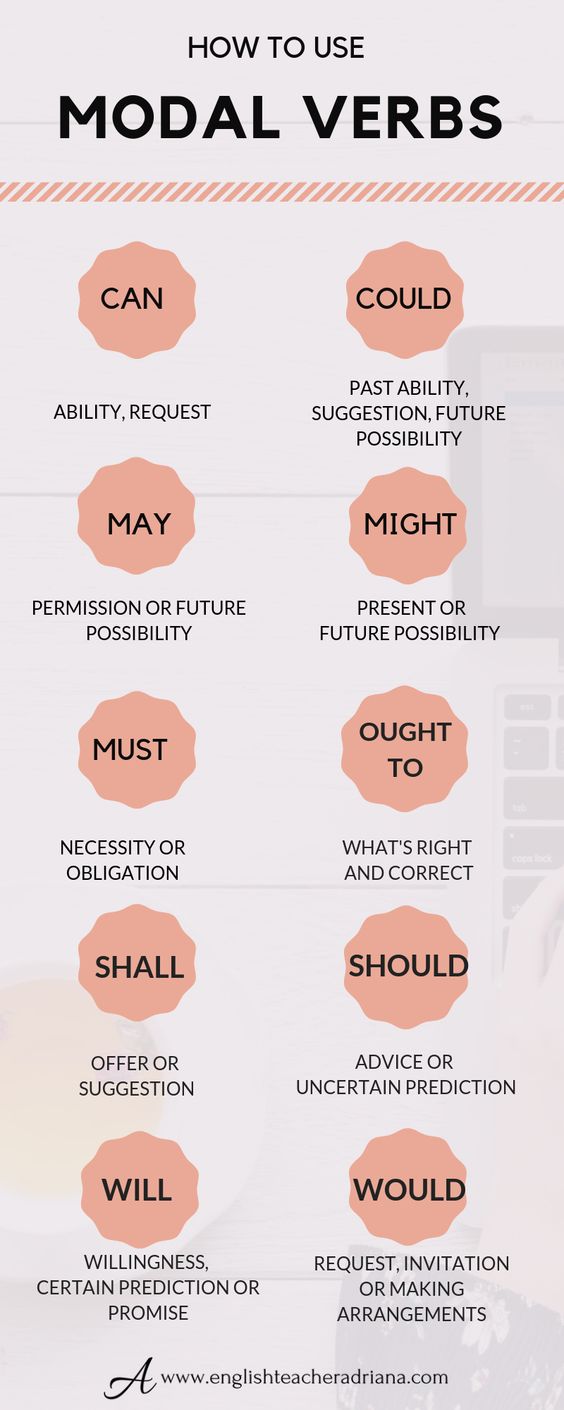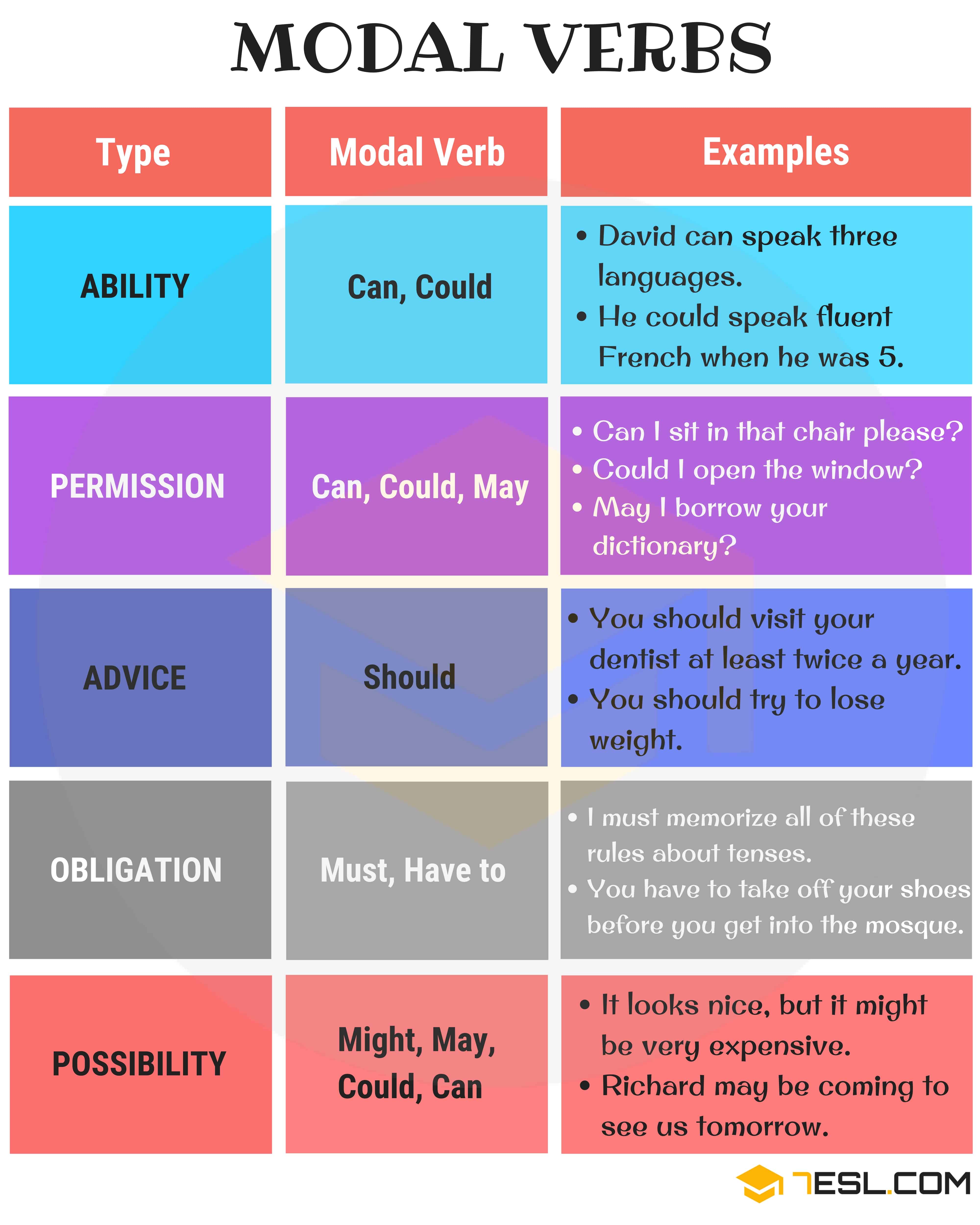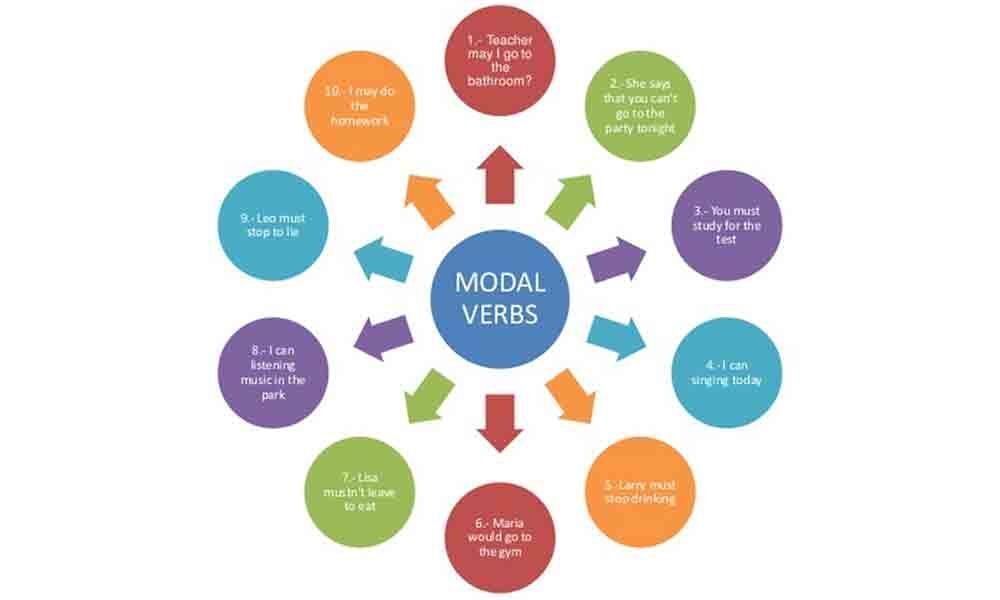
Valanglia HOW TO USE MODAL VERBS
Wollen (want) and möchten (would like) are used to express a desire or intention. Möchten is more polite than wollen. Lisa will in den Urlaub fahren. Lisa wants to go on vacation. Wir möchten zwei Tickets nach Berlin kaufen. We would like to buy two tickets to Berlin. This is how mögen, möchten and wollen are conjugated:

Modal verbs Introduction and Rules to follow ESL Innovative
Modal verbs aren't used on their own unless the main verb is clearly understood thanks to context. See an overview of modal verbs here. Notice that 'möchten' as the modal verb is conjugated and in the 2nd position of the sentence -right after the subject (if we're using Standard Word Order).

ALMANCA MÖCHTEN FİİLİ KONU ANLATIMI YouTube
Learn German modal verbs to express what would could, should, would, must, and can be done. Add deeper meaning to your German conversations.. The seventh modal: Möchten. In its simplest form, the present indicative tense of mögen (to like) is used to express our liking and politely wanting a certain person or thing:

Modal Verb In Tamil
German: Möchten German verb 'Möchten' conjugated. Cite this page.

What Are Modal Verbs? (2023)
Hallo & Hello,my name is Jannika. I am German teacher and this is one of my videos about German modal verbs. Learn how to use the present tense for the mo.

Modal Verb Konjugation ( möchten ) lesson 16 A1 level Learn German in Hindi 9999376799
The two modal verbs you learn about in this chapter are möchten (=would like) and können (=can). First off, you conjugate these verbs quite differently than the other verbs you've learned up to now: you do NOT add an -e to the end of the ich form, and you do NOT add a -t to the end of the er/sie/es form. In the case of können, there is.

germansimplepastmodal verbs The German Professor
It is actually a form of the German modal verb "mögen". To be precise "möchten" is the Konjuktiv 2 version of "mögen". It changes the translation from "to like" into "would like". Just as "would like" is used for polite requests in English, "möchten" is used to ask for things, too. "Möchten" is so commonly.

Modal Verb PDF
Modal verbs modify an action or situation by expressing the ideas of permission, ability, obligation, necessity, etc. The six German modal verbs are: dürfen - may / to be allowed to. können - can / to be able to. möchten - to like to / to want to. müssen - must / to have to. sollen - to be supposed to / should / ought to.

Modal Verbs Mix (All Tenses) Language Step By Step
There are 6 modal verbs in German: „ können ", „ wollen ", „ möchten ", „ sollen ", „ müssen ", „ dürfen ". Modal verbs express whether you can, want to, must, should, or are allowed to do something. Modal verbs are usually combined with a second verb ("main verb") and must be conjugated. German Modal Verbs follow.

MODAL VERBS 7 E S L
A Note About Zu. The 6 German Modal Verbs You Need to Know Now. Dürfen — May / to be allowed to. Können — Can. Wollen — Want. Müssen — To have to. Sollen — To be supposed to / to be expected to. Mögen — Like. Conjugations of German Modal Verbs.

(2) Modal verb Möchten YouTube
For a full breakdown of all of the modal verbs in German, click here. mögen, möchten and wollen: 3 Minuten Deutsch Conjugation of mögen, möchten and wollen: 3 Minuten Deutsch Conjugation of mögen, möchten & wollen mögen vs gern haben: 3 Minuten Deutsch "Mögen" is generally used as a stand alone verb.

MODAL VERBS 7 E S L
The modal verbs in German are dürfen (be allowed to/may), können (be able to/can), mögen (to like/may), müssen (to have to/must), sollen (to ought to/should) and wollen (to want to). Modal verbs express ability, necessity, obligation, permission or possibility. Master the rules for conjugating modal verbs and get tips on how and when to use.

Modal Verbs English Test Zone
The modal verb wollen expresses a desire or intention: Nico will studieren. (He wishes or plans to study.) In the singular the vowel o changes to i. There is one more modal verb that is used to express wishes, möchten (mögen): Nico möchte studieren. The modal verbs wollen and möchten are similar in meaning. Both describe something that one.

Modal VERB Lesson PLAN School Grade Level Grade 10 Teacher Learning Area English 10
The conjugation of the verb möchten (wish, want) is irregular. Basic forms are möchte, möchtete and hat gemöchtet. The auxiliary verb of möchten is haben. The flection is in Active and the use as Main. For a better understanding, countless examples of the verb möchten are available. For practicing and consolidating, there are also free.

Deutsch lernen die Modalverben Präsens + Präteritum/German modal verbs in simple present
The modal verb goes in second position in the sentence. The main verb goes at the end. Sometimes, you'll also find sentences that only use the modal verb. When it's obvious what the action in the sentence is, for example, the main verb is left off. Example: Ich will ein Eis [essen]! ("I want [to eat] ice cream!") 2. Möchten ("to wish.

MODAL VERBS
#LearnGermanOriginal #LearnGerman #GermanLevelA1Learn German lessons online for beginners course - We help you learn german in a quick and easy way. Learn Ge.